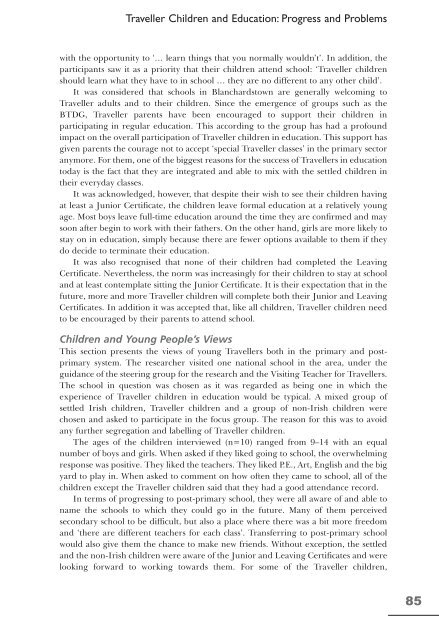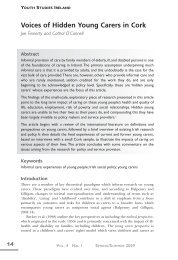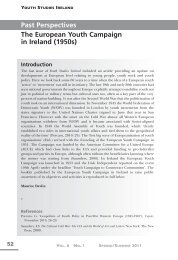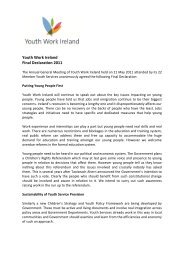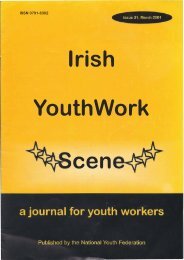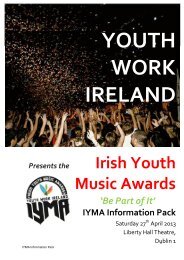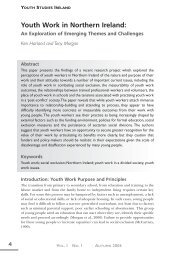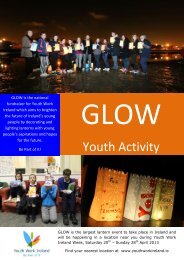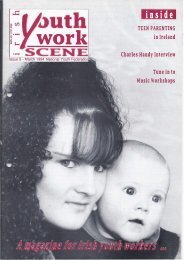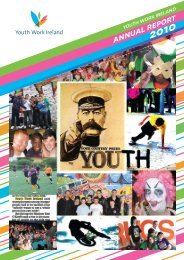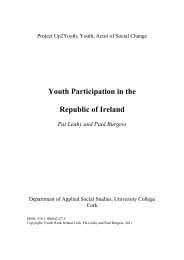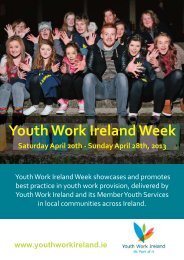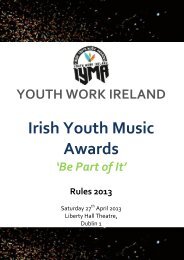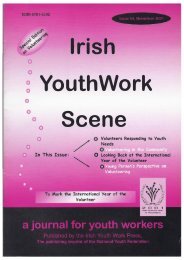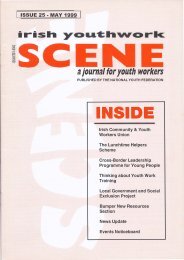Download full edition - Youth Work Ireland
Download full edition - Youth Work Ireland
Download full edition - Youth Work Ireland
Create successful ePaper yourself
Turn your PDF publications into a flip-book with our unique Google optimized e-Paper software.
Traveller Children and Education: Progress and Problemswith the opportunity to ‘… learn things that you normally wouldn’t’. In addition, theparticipants saw it as a priority that their children attend school: ‘Traveller childrenshould learn what they have to in school … they are no different to any other child’.It was considered that schools in Blanchardstown are generally welcoming toTraveller adults and to their children. Since the emergence of groups such as theBTDG, Traveller parents have been encouraged to support their children inparticipating in regular education. This according to the group has had a profoundimpact on the overall participation of Traveller children in education. This support hasgiven parents the courage not to accept ‘special Traveller classes’ in the primary sectoranymore. For them, one of the biggest reasons for the success of Travellers in educationtoday is the fact that they are integrated and able to mix with the settled children intheir everyday classes.It was acknowledged, however, that despite their wish to see their children havingat least a Junior Certificate, the children leave formal education at a relatively youngage. Most boys leave <strong>full</strong>-time education around the time they are confirmed and maysoon after begin to work with their fathers. On the other hand, girls are more likely tostay on in education, simply because there are fewer options available to them if theydo decide to terminate their education.It was also recognised that none of their children had completed the LeavingCertificate. Nevertheless, the norm was increasingly for their children to stay at schooland at least contemplate sitting the Junior Certificate. It is their expectation that in thefuture, more and more Traveller children will complete both their Junior and LeavingCertificates. In addition it was accepted that, like all children, Traveller children needto be encouraged by their parents to attend school.Children and Young People’s ViewsThis section presents the views of young Travellers both in the primary and postprimarysystem. The researcher visited one national school in the area, under theguidance of the steering group for the research and the Visiting Teacher for Travellers.The school in question was chosen as it was regarded as being one in which theexperience of Traveller children in education would be typical. A mixed group ofsettled Irish children, Traveller children and a group of non-Irish children werechosen and asked to participate in the focus group. The reason for this was to avoidany further segregation and labelling of Traveller children.The ages of the children interviewed (n=10) ranged from 9–14 with an equalnumber of boys and girls. When asked if they liked going to school, the overwhelmingresponse was positive. They liked the teachers. They liked P.E., Art, English and the bigyard to play in. When asked to comment on how often they came to school, all of thechildren except the Traveller children said that they had a good attendance record.In terms of progressing to post-primary school, they were all aware of and able toname the schools to which they could go in the future. Many of them perceivedsecondary school to be difficult, but also a place where there was a bit more freedomand ‘there are different teachers for each class’. Transferring to post-primary schoolwould also give them the chance to make new friends. Without exception, the settledand the non-Irish children were aware of the Junior and Leaving Certificates and werelooking forward to working towards them. For some of the Traveller children,85


